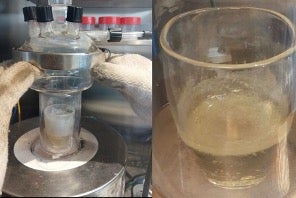
France-based nuclear start-up Naarea (Nuclear Abundant Affordable Resourceful Energy for All) is partnering with the French National Centre for Scientific Research (CNRS – Centre national de la recherche scientifique) and Université Paris-Saclay (UPS) to establish a laboratory dedicated to molten salt chemistry.
Naarea, founded in 2020 by Jean-Luc Alexandre and Ivan Gavriloff, is developing the XAMR molten salt fast neutron micro-generator (40MWe or 80MWt). The company has received support from the French Alternative Energies & Atomic Energy Commission (CEA) and CNRS, as well as industry players such as Assystem, Dassault Systèmes, Orano and Framatome.
The new Innovation Molten Salt Lab (IMS Lab) will benefit from 20-years of expertise in molten salt chemistry from the Laboratoire de Physique des 2 Infinis Irène Joliot-Curie (ICJLab), a joint research unit of CNRS and UPS with a team of nearly 730 people. Naareasays it will contribute “technological knowledge in the fields of materials, neutronics, safety analysis and materials and fuel data”.
IMS Lab’s roadmap “will aim to foster collaborative work and capitalise on the concepts and innovations developed at Naarea to the benefit of the European molten salt reactor sector … the goal … is to become the European leader in the field of molten salts research and development, for both molten salt nuclear reactors and other non-nuclear applications such as metallurgy and concentrated solar power”.
The roadmap will aim to foster collaborative work and capitalise on the concepts and innovations developed at Naarea to the benefit of the European molten salt reactor sector, in particular in the context of the strategic partnerships it recently formed. This collaboration also aims to create synergies with other public and private entities with an interest in research on the properties of molten salts.
Naarea CEO Jean-Luc Alexandre said IMS Lab “allows us to pool our skills and demonstrates our ability to step up our efforts to develop our XAMR project”. It also “marks a significant milestone for NAAREA, which is positioned to make a vital contribution to establishing and achieving recognition for true French leadership and expertise in the field of molten salt research at European level.”
Jean-Luc Moullet, Deputy CEO for Innovation at CNRS described IMS Lab as “an ambitious joint laboratory that symbolises the contribution of French research to the revival of the nuclear sector. The CNRS encourages the development of joint laboratories, which offer a flexible and long-term framework conducive to the development of fruitful public-private partnerships.”
Camille Galap, President of Université Paris-Saclay said the university is committed to contributing to finding solutions to scientific and technological challenges. “We are therefore delighted to join this partnership with Naarea and the CNRS to create the joint laboratory, IMS Lab, whose research work will help respond to the critical challenges of decarbonising energy, in particular for industry.”
Naarea and CNRS teams have been working together for a year and common patents are already being filed. They relate in particular to the technology for carrying out the synthesis of salts. Another concerns “the right element to mix with metal in the right proportion to avoid corrosion regardless of the reaction”, said Alexandre.
The laboratory will also be able to conduct experiments for other nuclear start-ups that relying on molten salts such as Stellaria or Thorizon, with which Naarea has a partnership. “The idea is to work for the sector, but also to open research on molten salts to non-nuclear applications, such as metallurgy or concentrated solar,” Alexandre added.






